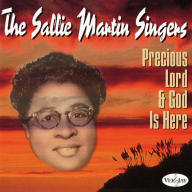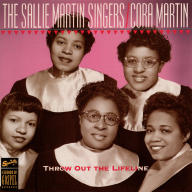Through the grapevine, Martin had heard about Thomas A. Dorsey, a one-time blues pianist whose original gospel songs were electrifying the Chicago church circuit. Through a mutual friend, she arranged to audition for Dorsey; despite serious misgivings -- her style was thoroughly unrefined, complete with whooping, groaning, and a great deal of physical movement (the latter a hallmark of the Pentecostal church), and to top it off, she couldn't even read music -- he eventually agreed to let her come aboard, and in early 1932, Martin made her debut with his group at the Ebenezer Baptist Church. A year passed before she was awarded her first solo, and for all of her lack of polish, Martin nevertheless instantly connected with audiences; over time Dorsey became increasingly aware of her value not only as a performer but also as an entrepreneur, as she took over his music store and within a few months was turning a tidy profit. Their relationship was often adversarial, but quickly it was apparent that neither could succeed without the other.
As gospel choruses instructed to sing Dorsey's songs began appearing throughout the Chicago area, Martin traveled to Cleveland in 1933 to organize a chorus there as well; in the years to follow, she helped set up similar groups throughout the South and Midwest, and also joined Dorsey in organizing the annual National Convention of Gospel Choirs and Choruses, serving as its first vice president until the time of her death. In 1940, however, relations between Martin and Dorsey reached their breaking point, and she went solo, teaming with a young pianist named Ruth Jones -- later to rocket to fame under the name Dinah Washington -- and began touring the country, traveling a gospel circuit which her earlier journeys had helped establish. That same year, Martin and gospel composer Kenneth Morris joined forces with financial backer Rev. Clarence H. Cobb to found Martin & Morris, Inc., a publishing company which in a few years was the biggest of its kind in the United States.
Martin's touring collaboration with the volatile Jones was short-lived, and she next began performing with the gifted pianist and arranger Roberta Martin (no relation). Again the partnership did not last, and she next formed her own ensemble, the Sallie Martin Singers; believed to be the first female group in gospel history, they existed until the mid-'50s. Despite her national renown, Martin never enjoyed the same kind of success on record earned by many of her contemporaries; she did score a few hits, however, among them Just a Closer Walk with Thee and He'll Wash You Whiter Than Snow, performed with Professor Alex Bradford. An active supporter of Dr. Martin Luther King, her involvement in the civil rights movement led to an invitation to attend the 1960 celebration marking the independence of Nigeria; Martin's visit inspired her to donate to the Nigerian Health Program, resulting in a state office building named in her honor. An astute businesswoman and tireless supporter of charitable causes, she died in Chicago on June 18, 1988. ~ Jason Ankeny, Rovi













